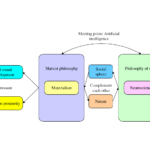Patricio Mena Malet, Universidad de La Frontera, Temuco, Chile
The article titled El mundo en exceso: fenomenología de la sorpresa y de la espera originaria offers a reinterpretation of surprise not as an episodic reaction but as a fundamental ontological structure that manifests the excess of the world in relation to consciousness.
In dialogue with authors such as Claude Romano, Henri Maldiney, Françoise Dastur, Jean-Luc Marion, and Emmanuel Housset, the article develops a phenomenology that places surprise at the heart of the event of appearing. Far from being a mere emotional reaction, surprise reveals the disproportion between what is expected and what is given, exposing the subject to a manifestation that exceeds and transforms them. This tension between anticipation and givenness is explored through three key concepts: affective interruption, originary waiting, and privileged experiences such as landscape and art.
The first section analyzes affective interruption as a structure that fractures the continuity of everyday experience. Surprise disrupts attention and unsettles the subject’s habitual way of being in the world. Rather than being a fleeting disturbance, this jolt appears as a decisive philosophical event, echoing the original wonder from which philosophy arises. Claude Romano describes it as a shock that unveils the contingency of appearing. Thus, surprise is not a secondary response, but an eruption that discloses the inexhaustible nature of sense and the impossibility of reducing reality to prior expectations.
The second part addresses originary waiting as a precondition for all surprise. This waiting is not directed toward a specific object but constitutes a structural openness to the advent of reality. It is a fundamental passivity of the subject, a disposition to be reached by something beyond control. In dialogue with Céline Flécheux and Michel Collot, the article argues that perception is sustained by a horizon of inactualities—a tense expectation that allows the unexpected to emerge. Far from being a weakness, this passibility is the very condition for any phenomenological donation.
The third section extends this analysis to two privileged experiences: landscape and art. Both suspend habitual perceptual patterns and expose the subject to a radical mode of appearing. In the case of landscape, it is not merely about a visible natural object but an eruption that disrupts perception itself and evokes an originary space, as Maldiney suggests. Art—especially the painting of Cézanne and Tal Coat—does not represent the world; it lets it emerge in its yet-unseen dimension. In both experiences, the phenomenon appears as something that had not been previously anticipated or conceptualized—as pure event of sense.
The article concludes by proposing a transformation in the concept of subjectivity. No longer the constituting “I” that organizes meaning, the subject is now one who is exposed, affected, and surprised. Surprise redefines thinking as lucid openness to the untimely and situates waiting and passivity as essential existential structures. Within this framework, Patricio Mena Malet proposes a philosophy of excess that does not close off meaning but allows it to come forth. His text invites us to think from interruption and fragility, recovering the donative dimension of appearing in a time dominated by predictability and control.
To read the article, access
MALET, P.M. El mundo en exceso: fenomenología de la sorpresa y de la espera originaria. Trans/Form/Ação [online]. 2025, vol. 48, no. 4, e025107 [viewed 1 August 2025]. https://doi.org/10.1590/0101-3173.2025.v48.n4.e025107. Available from: https://www.scielo.br/j/trans/a/qrKwcCFM7g7Q5cS74cRRfNp/
External Links
Trans/Form/Ação – Journal: Instagram | Facebook | Academia.edu
About Patricio Mena
Patricio Mena Malet holds a PhD in Philosophy from the Pontificia Universidad Católica de Valparaíso (2009). He is Full Professor at the Universidad de La Frontera (Temuco, Chile), where he is a member of the Centro de Estudios Filosóficos (CEF) and Director of the Scientific-Technological Research Nucleus in Social Sciences and Humanities. His research focuses on phenomenology and hermeneutics, especially on passivity, affectivity, and the event-character of human existence. He has co-edited several books, including ¿Hacia las cosas mismas? (2018), De la transpasibilidad (2021), Paul Ricœur: junto, más allá y por debajo de su obra (2022), and La odisea de sí (2023). He recently published Spanish translations of Philippe Grosos’s Lo reversible y lo irreversible (2023) and La primera imagen (2024).
Como citar este post [ISO 690/2010]:




















Recent Comments